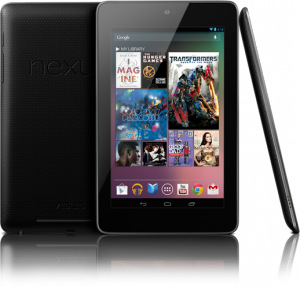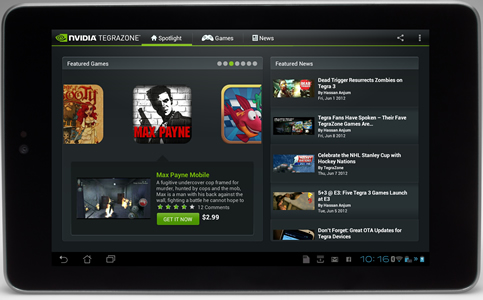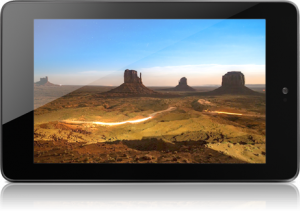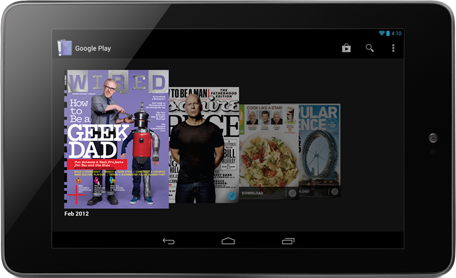I recently came across an article from GearDiary entitled ‘5 Reasons Why the $199 Google Tablet is a Terrible Idea…‘, which as you’d expect includes five reasons that the Nexus 7 is bad – for Android’s position in the marketplace, for Google and for consumers. While the author, Michael Anderson, concludes that he’ll be getting one anyway, I disagree with his initial points and I thought I’d dispute them here. So, without further ado –
5 reasons why the Google Nexus 7 is a jolly good idea.

1. Expanding the Nexus brand – In his first point, Michael spoke about the brand recognition (or lack thereof) that the Nexus currently has. He notes the dismal failure of the Nexus One, the first phone to be sold directly from Google.
I’d point to the Galaxy Nexus in turn – a phone that is currently available directly from Google in the US at a rather incredible price of £225 ($349) – or at least it would be if it wasn’t currently banned through an injunction brought by Apple. That phone has sold rather well in the UK, and more importantly made headlines here in the same way that the iPhone and the Samsung Galaxy S III did – we’re talking mainstream TV and newspaper coverage of people waiting in lines and talking about how they’re excited about the phone. While the Nexus brand at the moment appeals to those in know, it’s becoming a lot more recognisable – and as prices drop, much more attractive to consumers.
This’ll go double for the Nexus 7, which will be released in territories like the UK, Australia and Canada where the Kindle Fire was never released. That means the low-cost tablet will be the first of its kind, offering the in-vogue tablet form factor from a big name at an absurd price. If that doesn’t raise the profile of the Nexus brand name, I don’t know what will.

2. Devaluation of the iPad – The second point Michael addressed was the devaluation of the Android tablet market that the Nexus 7 promotes – and he’s right that other manufacturers will face a lot of pressure to compete with a £159 ($200) tablet. But the Nexus 7 is only doing the inevitable – just as we’ve seen Ultrabook prices fall, and PC prices before that, tablets will come to rest at a much lower price point than they did initially.
Interestingly, that strategy may suit Android (and therefore Google) more than it will Apple and its iPad. Initially the iPhone had a lot of success in the industry, but it’s been blotted out by the huge swath of Android smartphones that offer any conceivable combination of price points and features. I’m confident that the same will happen to Apple; they may have the best single tablet, but they’ll still be only a fraction of the total number of tablets sold. And as more tablets do get sold, led by the Google Nexus 7, the more tablet-specific apps will be produced, and the stronger the Android ecosystem will be as a result.

3. The best 7″ tablet ever – This point is the easiest to debunk – while Michael insisted that the experience is pretty basic, pointing to the lack of storage space, expansion slots, rear camera and the choice of materials, I think it is brilliant for precisely the same reasons.
This tablet is perfectly suited to its role as a media consumption vessel – while it has limited storage, it’s meant for streaming content, not permanently downloading it. This focus dominates every aspect of the tablet’s design and specifications – the HD IPS display, the comfortable rubber backing, the powerful quad-core Tegra 3 chipset. While having a micro SD card slot or HDMI-out port would have made this tablet better, it’s clear that Google did everything they could to hit that $200 price point while still delivering a tablet of quality, befitting of a collaboration between two of the biggest names in Android.

4. Google is growing its ecosystem – Michael’s point here was that Google don’t have a big enough ecosystem to support a media-rich tablet. I believe that Google has to start somewhere and the Google Nexus 7 is that place. It’s a chicken and egg problem; you can’t have a massive ecosystem and nothing to support it any more than you can have a popular media consumption device and no ecosystem behind it.
While it still isn’t as large as Amazon or Apple, Google still has a comprehensive offering. I think the largest cause of its subpar growth is the very fact that it doesn’t have an essential and incredibly popular device to promote what’s available – the Amazon has the Kindle and the Fire, Apple have the iPad. Until now, there hasn’t been something of that magnitude for Google. And while it may be comparatively small, the Google Play marketplace has more than enough for consumers to consider using it if it’s integrated well – and on the Nexus 7, it is well branded and easy to use. I expect that once the Nexus 7 has launched, we’ll see a lot more from the Google ecosystem too.

5. Surely being open is a good thing? – Michael’s final point is that the Nexus 7 has been proposed as ‘Built for Google Play’; a nexus (haha) of media streaming through Google channels. He goes on to say that customers will want to use other, competing services instead of the Google offerings, cutting into Google’s revenue stream from the Nexus 7. That’s true – but it doesn’t mean Google will lose.
Google have an unbelievable knack for moving into new areas, then providing a well integrated solution that is simply better – or at least as good – as their competitors. Look at what Gmail did for email, Docs did for word processing, Android did for smartphones. They continue to expand their reach – even this week they were in the news for duplicating Shazam with their new Google Ears audio search.
These services win out in the long haul because Google has practically unlimited infrastructure, a pool of clever engineers with the freedom to develop and everything is tied into their back-end services. While some haven’t been successful right away (Google+) and others have faded to black (Google Wave), overall they’re still pulling way ahead.
And in the mean time, having more services available is good for consumers – I’d much rather have a Google tablet where I have the choice of Amazon, Apple or Google’s offerings than being limited to just one. While I might not pick the Google solution each time, I’m still drawn to the platform – and as the Google apps improve, I’m more likely to use them thanks to that tighter integration I mentioned earlier. So again, I see this as a positive for the platform rather than a negative – if you’re using the Nexus 7, then Google has done better than if you’ve bought a Kindle Fire or an iPad, right?
I’ve ordered a Google Nexus 7
So as you may have guessed, I think the Nexus 7 is fantastic and I ordered one before its video trailer had finished playing. It’s been designed with focus and ambition, it supports ever-improving Google services but allows me to choose and fosters competition amongst tablet vendors. What’s not to like?
Mobile Fun is the best place in the UK to find Google Nexus 7 accessories.